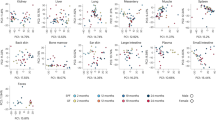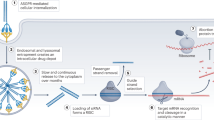Abstract
THE mechanism by which phenobarbital lowers serum bilirubin levels in some patients with jaundice is undefined1–3 although there is some evidence of enhanced synthesis of bilirubin glucuronyl transferase4–7, the hepatic microsomal enzyme which mediates the conjugation of bilirubin before it is excreted into bile. It is also possible, however, that phenobarbital acts by augmenting other excretory pathways involving the degradation of bilirubin to polar breakdown products1–3,8. If phenobarbital enhances the capacity of the liver to conjugate bilirubin, response to drug therapy should be associated with increased excretion of bilirubin into bile. If, on the other hand, phenobarbital augments the other excretory pathways, bile bilirubin should remain unchanged. I have investigated this in male heterozygous and homozygous Gunn rats and Sprague–Dawley rats, weighing 350–500 g.
This is a preview of subscription content, access via your institution
Access options
Subscribe to this journal
Receive 51 print issues and online access
$199.00 per year
only $3.90 per issue
Buy this article
- Purchase on Springer Link
- Instant access to full article PDF
Prices may be subject to local taxes which are calculated during checkout
Similar content being viewed by others
References
Whelton, M. J., Krustev, L. P., and Billing, B., Amer. J. Med., 45, 160 (1968).
Kreek, M. J., and Schleisenger, M. H., Lancet, ii, 73 (1968).
Crigler, J. F., and Gold, N. I., J. Clin. Invest., 48, 42 (1969).
Catz, C., and Yaffe, S. J., Amer. J. Dis. Child, 104, 516 (1962).
Yaffe, S. J., Levy, G., Matsuzawa, T., and Baliah, T., New Engl. J. Med., 275, 1461 (1966).
De Leon, A., Gartner, L. M., and Arias, I. M., J. Lab. Clin. Med., 70, 273 (1967).
Arias, I. M., Gartner, L. M., Cohen, M., Ben Ezzer, J., and Levi, A. M., Trans. Assoc. Amer. Phys., 181, 66 (1968).
Schmid, R., and Hammaker, L., J. Clin. Invest., 42, 1720 (1963).
Weinbren, K., and Billing, B., Brit. J. Exp. Path., 37, 199 (1956).
Malloy, H. T., and Evelyn, K. A., J. Biol. Chem., 119, 481 (1937).
Roberts, R. J., and Plaa, G. L., Biochem. Pharm., 16, 827 (1967).
Carbone, J., and Grodsky, G. M., Proc. Soc. Exp. Biol. and Med., 94, 461 (1957).
Lathe, G. H., and Walker, M., Biochem. J., 67, 9P (1957).
Schmid, R., Axelrod, J., Hammaker, L., and Swarm, R. L., J. Clin. Invest., 37, 1123 (1958).
Arias, I. M., J. Histochem. Cytochem., 7, 250 (1959).
Arias, I. M., Johnson, L., and Wolfson, S., Amer. J. Physiol., 200, 1091 (1961).
Snyder, A. L., Saterlee, W., Robinson, S. H., and Schmid, R., Nature, 213, 93 (1967).
Author information
Authors and Affiliations
Rights and permissions
About this article
Cite this article
ROBINSON, S. Increased Bilirubin Conjugation in Heterozygous Gunn Rats treated with Phenobarbital. Nature 222, 990–991 (1969). https://doi.org/10.1038/222990a0
Received:
Revised:
Issue Date:
DOI: https://doi.org/10.1038/222990a0
This article is cited by
-
Bilirubin metabolism in gunn rats treated with phenobarbital
Gastroenterologia Japonica (1972)
-
Increased bilirubin conjugation in the liver and intestinal mucosa of phenobarbital treated rats
Experientia (1972)
Comments
By submitting a comment you agree to abide by our Terms and Community Guidelines. If you find something abusive or that does not comply with our terms or guidelines please flag it as inappropriate.



